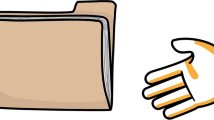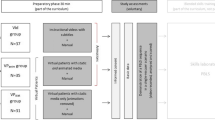Abstract
Patient communication courses are time-intensive, making incorporation into residency curricula challenging. Using a short video could be an efficient means to teach residents communication skills. We created a 4-min animated video focused on the “ask more and summarize technique”. Residents rotating on the inpatient oncology and palliative care service received a video link with a survey (S1) on the tool and its projected utility. A second survey (S2) was sent upon rotation completion to assess the utility of the technique. A 6-month follow up e-mail was sent to determine retention of skills. A total of 52/106 residents responded to S1 and 32/52 to S2. Median age was 28 years and 86% were PGY-1. On S1, 95% enjoyed the format, and 95% thought the narration was an effective learning tool and 90% that the animation was effective. A majority (87%) felt the tool would be useful. On comparing self-reported acquisition of skills for paired survey responses, there was a significant increase in asking more regarding patient questions (p = 0.04) but not summarizing back responses (p = 0.1). This tool was reported to be useful in a variety of settings including explaining prognoses, unrealistic patient expectations, upset patients, and patients with fear or anxiety. A 6-month follow up survey (n = 22) showed that almost all the respondents continued to report using the skills learned. A short video is a brief and effective tool that can be incorporated into a busy clinical curriculum to teach residents communication skills in the areas of cancer and palliative care.

Similar content being viewed by others
References
Ramirez AJ, Graham J, Richards MA, Cull A, Gregory WM, Leaning MS, Snashall DC, Timothy AR (1995) Burnout and psychiatric disorder among cancer clinicians. Br J Cancer 71(6):1263–1269
Holt KD, Miller RS, Nasca TJ (2010) Residency programs’ evaluations of the competencies: data provided to the ACGME about types of assessments used by programs. J Grad Med Educ 2(4):649–655
Sandhu D (2018) Postgraduate medical education – challenges and innovative solutions. Med Teach 40(6):607–609
Bos-van den Hoek DW, Visser LNC, Brown RF, Smets EMA, Henselmans I (2019) Communication skills training for healthcare professionals in oncology over the past decade: a systematic review of reviews. Curr Opin Support Palliat Care 13(1):33–45
Moore PM, Rivera S, Bravo-Soto GA, Olivares C, Lawrie TA (2018) Communication skills training for healthcare professionals working with people who have cancer. Cochrane Database Syst Rev 7:CD003751
Chen BY, Kern DE, Kearns RM, Thomas PA, Hughes MT, Tackett S (2019) From modules to MOOCs: application of the six-step approach to online curriculum development for medical education. Acad Med 94(5):678–685
Kaplovitch E, Otremba M, Morgan M, Devine LA (2019) Cost-efficient medical education: an innovative approach to creating educational products. J Grad Med Educ 11(6):713–716
Kyaw BM, Posadzki P, Paddock S, Car J, Campbell J, Tudor CL (2019) Effectiveness of digital education on communication skills among medical students: systematic review and meta-analysis by the digital health education collaboration. J Med Internet Res 21(8):e12967
Patell R, Gutierrez A, Lee N, Neuendorf K (2018) Practicing communication skills for responding to emotionally charged questions. J Palliat Care 33(4):209–214
Harris PA, Taylor R, Thielke R, Payne J, Gonzalez N, Conde JG (2009) Research electronic data capture (REDCap)--a metadata-driven methodology and workflow process for providing translational research informatics support. J Biomed Inform 42(2):377–381
Dwamena F, Holmes-Rovner M, Gaulden CM et al (2012) Interventions for providers to promote a patient-centred approach in clinical consultations. Cochrane Database Syst Rev 12:CD003267
Salib S, Glowacki EM, Chilek LA, Mackert M (2015) Developing a communication curriculum and workshop for an internal medicine residency program. South Med J 108(6):320–324
Hardee JT, Rehring TF, Cassara JE, Weiss K, Perrine N (2019) Effect and durability of an in-depth training course on physician communication skills. Perm J 23:18–154
Hopkins L, Hampton BS, Abbott JF, Buery-Joyner SD, Craig LTB, Dalrymple JL, Forstein DA, Graziano SC, McKenzie ML, Pradham A, Wolf A, Page-Ramsey SM (2018) To the point: medical education, technology, and the millennial learner. Am J Obstet Gynecol 218(2):188–192
Markowitz RI, Reid JR (2018) Teaching and learning in the millennial age. Pediatr Radiol 48(10):1377–1380
Fleetwood J, Vaught W, Feldman D, Gracely E, Kassutto Z, Novack D (2000) MedEthEx online: a computer-based learning program in medical ethics and communication skills. Teach Learn Med 12(2):96–104
Kaltman S, Talisman N, Pennestri S, Syverson E, Arthur P, Vovides Y (2018) Using technology to enhance teaching of patient-centered interviewing for early medical students. Simul Healthc 13(3):188–194
Curtis JR, Back AL, Ford DW, Downey L, Shannon SE, Doorenbos AZ, Kross EK, Reinke LF, Feemster LC, Edlund B, Arnold RW, O’Connor K, Engelberg RA (2013) Effect of communication skills training for residents and nurse practitioners on quality of communication with patients with serious illness: a randomized trial. JAMA. 310(21):2271–2281
Engler CM, Saltzman GA, Walker ML, Wolf FM (1981) Medical student acquisition and retention of communication and interviewing skills. J Med Educ 56(7):572–579
Finset A, Ekeberg O, Eide H, Aspegren K (2003) Long term benefits of communication skills training for cancer doctors. Psychooncology. 12(7):686–693
Zell E, Krizan Z (2014) Do people have insight into their abilities? A Metasynthesis. Perspect Psychol Sci 9(2):111–125
Gude T, Finset A, Anvik T, Bærheim A, Fasmer OB, Grimstad H, Vaglum P (2017) Do medical students and young physicians assess reliably their self-efficacy regarding communication skills? A prospective study from end of medical school until end of internship. BMC Med Educ 17(1):107
Sedgwick P (2014) Non-response bias versus response bias. BMJ. 348:2573
Author information
Authors and Affiliations
Corresponding author
Additional information
Publisher’s Note
Springer Nature remains neutral with regard to jurisdictional claims in published maps and institutional affiliations.
Appendices
Appendix 1. Animated video tool
https://www.youtube.com/watch?v=udvSYZ1trKQ&t=5s
Appendix 2. Survey 1
-
1.
Before doing the module, how often were finding out more information about questions patients were asking?
-
Never
-
Almost Never (~ 1–2 a month)
-
Rarely (~ 1–2 times a week)
-
Often (1–2 times a day)
-
Very Often (3–5 times a day)
-
Extremely often (5–10 times a day)
-
Always (almost every patient encounter, every day)
-
-
2.
Before doing the module, how often were you summarizing back to patient’s what you heard them say?
-
Never
-
Almost Never (~ 1–2 a month)
-
Rarely (~ 1–2 times a week)
-
Often (1–2 times a day)
-
Very Often (3–5 times a day)
-
Extremely often (5–10 times a day)
-
Always (almost every patient encounter, every day)
-
-
3.
After watching the module, how useful do you feel the information provided will be during the rest of your training?
-
Not at all useful
-
Of little Use
-
Useful
-
Somewhat Useful
-
Very Useful
-
-
4.
On your oncology/palliative rotation, how often do you think you will use the skills taught in today’s module?
-
Never
-
Almost Never (~ 1–2 a month)
-
Rarely (~ 1–2 times a week)
-
Often (1–2 times a day)
-
Very Often (3–5 times a day)
-
Extremely often (5–10 times a day)
-
Always (almost every patient encounter, every day)
-
-
5.
If you could make one major change to the module what would it be?
-
6.
Age
-
7.
Gender
-
Male
-
Female
-
Other
-
-
8.
Stage of Training
-
Medical Student
-
PGY 1
-
PGY 2
-
PGY 3
-
PGY 4
-
-
9.
Have you attended any formal communication training so far during residency?
-
Yes
-
No
-
Appendix 3. Survey 2
-
1.
During the oncology rotation how often did you find out more information about patient’s questions?
-
Never
-
Almost Never (~ 1–2 a month)
-
Rarely (~ 1–2 times a week)
-
Often (1–2 times a day)
-
Very Often (3–5 times a day)
-
Extremely often (5–10 times a day)
-
Always (almost every patient encounter, every day)
-
-
2.
During the oncology rotation how often did you find out more and summarize back to patient’s what you heard them say?
-
Never
-
Almost Never (~ 1–2 times over 4 weeks)
-
Rarely (~ 1–2 times a week)
-
Often (1–2 times a day)
-
Very Often (3–5 times a day)
-
Extremely often (5–10 times a day)
-
Always (almost every patient encounter, every day)
-
-
3.
On the rotation, under what circumstances did you find yourself using the “Ask More & Summarize” technique? (choose all that apply)
-
Explaining prognosis to patient
-
Unrealistic patient expectations
-
Angry/Upset patients or their families
-
Patients with fear and/or anxiety
-
Other (please specify in space below)
-
Please list ‘other’ circumstances you found technique useful.
-
-
4.
On the rotation, was there a time(s) that you wish you would have used the “Ask More & Summarize” technique, but did not?
-
Yes
-
No
-
Please list reasons you could not use the technique:
-
5.
What other communication skills did you find helpful during your oncology/palliative rotation? (choose all that apply)
-
Empathy
-
Agenda Setting
-
Conveying value + respect
-
Listening to the patient’s perspective
-
Teach Back
-
Other (please specify below)
-
Please specify other techniques/skills used
-
6.
Age
-
7.
Gender
-
Male
-
Female
-
Other
-
-
8.
Stage of Training
-
Medical Student
-
PGY 1
-
PGY 2
-
PGY 3
-
PGY 4
-
Appendix 4. Survey 3
-
1.
In the last 1 month, how often did you find out more information about patient’s questions before answering them?
-
Never
-
Almost Never (~ 1–2 a month)
-
Rarely (~ 1–2 times a week)
-
Often (1–2 times a day)
-
Very Often (3–5 times a day)
-
Extremely often (5–10 times a day)
-
Always (almost every patient encounter, every day)
-
-
2.
In the last 1 month, how often did you summarize back to patients what you heard them say?
-
Never
-
Almost Never (~ 1–2 times over 4 weeks)
-
Rarely (~ 1–2 times a week)
-
Often (1–2 times a day)
-
Very Often (3–5 times a day)
-
Extremely often (5–10 times a day)
-
Always (almost every patient encounter, every day)
-
-
3.
During which rotations did you use these above techniques? (Check all that apply)
-
Oncology
-
Palliative care
-
ICU
-
General medicine wards
-
Subspecialty wards (cardiology, liver, etc)
-
Primary care clinic
-
Subspecialty clinic
-
-
4.
Under what circumstances did you find yourself using these techniques? (Check all that apply)
-
Explaining prognosis to patient
-
Unrealistic patient expectations
-
Angry/Upset patients or their families
-
Patients with fear and/or anxiety
-
Other (please specify in space below)
-
Please list ‘other’ circumstances you found technique useful.
-
Rights and permissions
About this article
Cite this article
Patell, R., Maddaleni, G., Dodge, L. et al. Communication Skills Training for Internal Medicine Residents Using a Brief Animated Video. J Canc Educ 37, 379–386 (2022). https://doi.org/10.1007/s13187-020-01825-y
Published:
Issue Date:
DOI: https://doi.org/10.1007/s13187-020-01825-y




